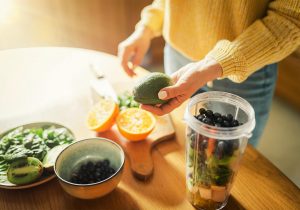
Processing potassium
Potassium is so much more than just a banana’s claim to fame. This essential mineral is vital for every cell, all of the tissues, and many functions in your body. The importance of potassium can often be overlooked, but it’s important for people to understand the recommended dietary allowance (RDA) of potassium. So, take a healthy look at why this mineral is a must, how much potassium per day you need, what foods provide potassium, and which foods are highest in potassium, so you know how to get your daily RDA of potassium. Then, learn what happens if you don’t get enough potassium or possibly get too much.
The essentials of potassium
Potassium is considered an essential mineral because it’s truly essential to your health. This mineral is known as an electrolyte because it has an electrical charge that triggers some of your body’s most critical cell and nerve functions. How much potassium per day you need is based on personal factors and a general recommendation. Luckily, potassium is naturally found in many foods and as a dietary supplement. By knowing what foods provide potassium, you’ll understand how to get your daily RDA of potassium to keep your levels from going too low.
Potassium drives many vital functions
Potassium plays many important roles that enable your body to function. As an electrolyte, this mineral conducts electrical charges that power some of the most vital processes in your body. Along with regulating your heartbeat and maintaining the ideal balance of fluids and electrolytes in your body, potassium also tells your nerves to send out signals, keeps your muscles moving, and flushes excess sodium out of your body. As a result, potassium can help maintain healthy blood pressure, support proper muscle and nerve function, and may reduce your risk of stroke, kidney stones, heart disease, and osteoporosis.
Understand your potassium needs
How much potassium you need per day depends on your age and your gender. Knowing the number of milligrams you need each day will help you understand how to get your daily RDA of potassium. The recommended average daily intake of potassium includes the following for different age groups:
- Infants up to 6 months old: 400 milligrams
- Infants 7 to 12 months old: 860 milligrams
- Children 1 to 3 years old: 2,000 milligrams
- Children 4 to 8 years old: 2,300 milligrams
- Boys 9 to 13 years old: 2,500 milligrams
- Girls 9 to 13 years old: 2,300 milligrams
- Teen boys 14 to 18 years old: 3,000 milligrams
- Teen girls 14 to 18 years old: 2,300 milligrams
- Men 19+ years old: 3,400 milligrams
- Women 19+ years old: 2,600 milligrams
- Pregnant teens: 2,600 milligrams
- Pregnant women: 2,900 milligrams
- Breastfeeding teens: 2,500 milligrams
- Breastfeeding women: 2,800 milligrams
Foods full of potassium
Now that you’re aware of how much potassium you need each day, you need to know what foods provide potassium so you can get your fill. When it comes to your RDA of potassium, bananas may be the first food that comes to mind, but many fruits, vegetables, beans, and proteins are also packed with potassium. Check out which foods are highest in potassium to give your body what it’s craving:
- Avocados
- Bananas
- Baked potatoes with skin
- Acorn squash
- Cooked spinach
- Salmon
- Yogurt
- Artichokes
- Cantaloupe
- Tomatoes
Too little is a big deal
So, what happens if you don’t get enough potassium? If you’re not getting enough of this nutrient every day, your body will let you know in a number of ways, including:
- Muscle cramps that keep cramping your style – Potassium is needed for smooth muscle contraction. Low levels can lead to sudden spasms, cramps, and aches.
- You feel weak and weary – One of the first signs of a potassium deficiency is fatigue because your cells depend on potassium for energy.
- Your heart is pounding – If you’re getting too little of this mineral, your body’s balance of potassium and sodium is off. This makes it harder for your heart to pump blood, which can cause an abnormal heartbeat.
- Your blood pressure soars – Without enough potassium to flush the sodium out of your body, your sodium level spikes, which elevates your blood pressure.
- Constant constipation – Potassium helps send signals between your brain and your digestive system. A low level can weaken these signals and your body won’t know when it’s time to go. In this case it’s best to know which foods are highest in potassium so you can go.
Why enough is enough
Getting too much potassium can be worse than not getting enough. Your kidneys normally maintain a proper balance of potassium by flushing excess sodium out of your body. But if you consume too much potassium in your meals, overuse potassium supplements, have advanced kidney disease, or are taking certain medications, you can have too much potassium in your blood, which is known as hyperkalemia. Some of the signs include weakness, exhaustion, trouble breathing, nausea, vomiting, and heart palpitations. Contact your SignatureMD-affiliated doctor immediately if you have any of these serious symptoms.
By understanding why potassium is essential and what foods provide potassium, you’ll be able to maintain a healthy balance for life.
Sources:
- https://ods.od.nih.gov/factsheets/Potassium-Consumer/
- https://www.hsph.harvard.edu/nutritionsource/potassium/
- https://www.verywellhealth.com/health-benefits-of-potassium-4588613
About SignatureMD
SignatureMD is one of the nation’s largest firms providing initial conversion and ongoing support services to concierge medicine physicians. SignatureMD currently partners with over 200 affiliated primary care physicians and specialists across 35 states, and its network is rapidly expanding.